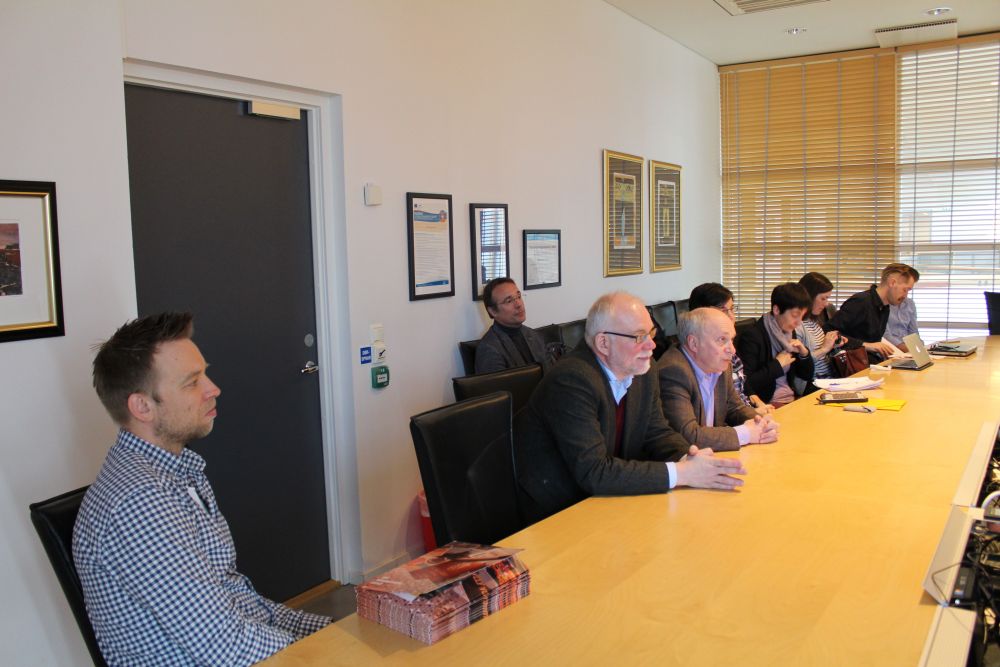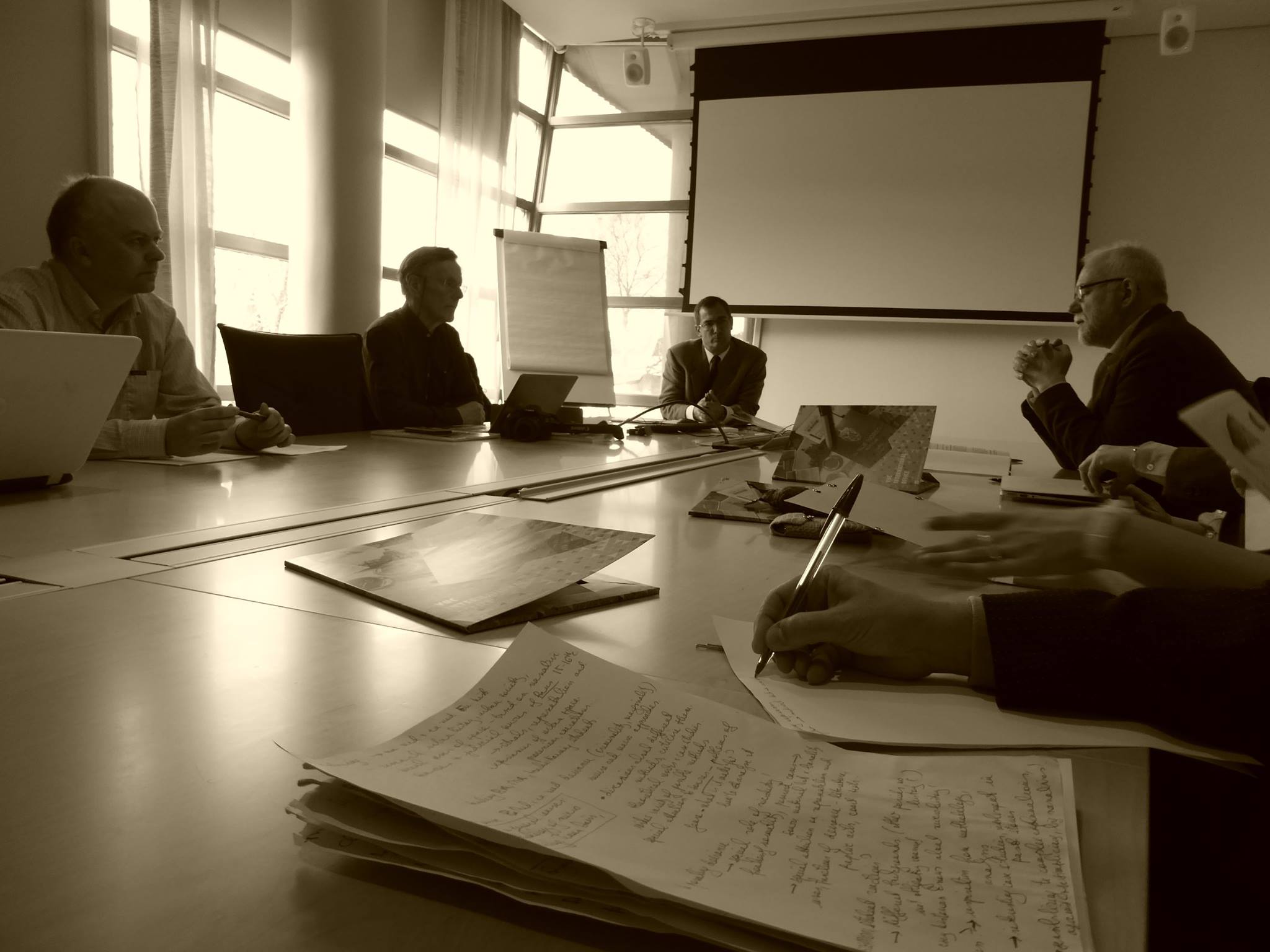Various suggestions for an English-language MA in Microhistory and institutional declarations
The Volda Workshop on 26-27 April, 2016. Summary
In the partnership of Loránd Eötvös University (Budapest), the University of Iceland (Reykajvík), Volda Unversity College (Norway) and the Reykjavík Academy (Iceland), the second event of the project Working out the curriculum of a joint MA programme ’Microhistory’, financed by Tempus Public Foundation, took place in Norway between 26 and 27 April 2016. The 25 April was the arrival day, sessions were held on 26 and 27 April at Volda University College, and participants’ departure took place on 28 April. The programme organized by our Norwegian colleagues allowed for excursions and common meals that allowed for us to continue our discussions in a more relaxed manner. The first session was opened by our host, the Rector of Volda University College.
In the first round of brief introduction (also necessary because of the new participants), Statements were made on the particpant’s willingness (or the lack of it) in taking part in the actual implementation of an international English-language MA in Microhistory. This could be full institutional support in the participation; a possible participation; or an individual participation – if there is willingness from the part of a participating institution to accept a foreign teacher as member of its staff. It became clear that it was the University of Iceland and the National Research University, Higher School of Economics, Moscow which was willing to actually embark on an international cooperation aiming at establishing an international English-language MA in Microhistory. It is to be added that although the colleagues from Carl Ossietzky University, Oldenburg, Germany was not present, she could assure us of the institutional support provided by her university. Beyond this inner circle of three institutions, the rest of the participants could either envisage private participation in the planned international MA in Microhistory or hope for an institutionalized participation realized, however either only later or only on a more modest level.
As a basis of the second round of discussions at Volda, the series of pilot courses were held in the participating institutions during the project (from the spring semester of 2015 through the autumn semester of 2015 to the spring semester of 2016): six of these were held at Eötvös University, Budapest, one at Volda University College, Norway and one at the University of Iceland, Reykjavík. The teachers of these courses were asked to share course curricula with other members of the project beforehand. This was done through our internet site. Also, here three more relevant, though older courses’ curricula were made public, one held in the USA by an Icelandic participant of the project and two more courses’ curricula, held at Eötvös University, Budapest. At the second session of the Volda workshop, each participant was asked to speak in 10-20 minutes about his or her personal experiences in teaching microhistory – be it in connection to the ’pilot courses’ that have been taught this academic year or earlier. Information was shared about students’ reactions.
The third session was consecrated to the twin problem of the structure and content of the suggested curriculum for an English-language MA in Microhistory. Two versions were available at the homepage of the project from the autumn on f 2015, and to this comments arrieved from American and German colleagues (and were also made public). The latter included a fully fledged third suggestion in fact, and this served as the basis of our discussion. All the participants had an opportunity to make suggestions and most of them did so in reference to Prof. Freist’s suggested curriculum.
It is important that although this actual Norwegian-Icelandic-Hungarian project (financed by Tempus Public Foundation, Budapest) is aimed at elaborating the curriculum of an English-language MA in Microhistory, with no obligation of the participating institutions to take part in the actual implementation of this MA on one hand, and with no obligation on the part of those universities that will embark on accrediting and teaching this MA to realize this following this blueprint to every detail, on the other (and therefore no binding obligations were expected to be made), participants at the workshop in Volda actually intend to realize such an international cooperation and they are willing to work together towards achieving this aim. This is the reason why the Volda workshop meant a significant step forward made towards establishing an international cooperation that will actually launch such an MA.
From the discussion a coordinated suggestion emerged as for the suggested curriculum of an international English-language MA in Microhistory, which is, however, by no means binding the hands of those who embark on realizing this cooperation. It also emerged that in the summer, when the Rector of the University of Iceland is to visit Moscow, the National Research University, Higher School of Economics, the fist step may be made towards this cooperation by arriving at an agreement of theses two institutions. This may later be enlarged to include other institutions.
The more relaxed discussion, conducted later, allowed for refining certain details, and also to proceed towards planning the last event of the partnership of Loránd Eötvös University, the University of Iceland, Volda Unversity College and the Reykjavík Academy, the project Working out the curriculum of a joint MA programme ’Microhistory’, financed by Tempus Public Foundation, which is going to be a conference held in Reyjavík. This will give a chance to students participants of the pilot courses to present their papers (either of a microhistorical character or about microhistory), as well as discuss microhistory with experienced and renowned colleagues, and listen to their lectures.
Suggested curriculum of a joint international English-language MA programme ’Microhistory’
Module 1: Introduction
Course 1/1: The historiography of microhistory
Course 1/2 : Theories and approaches of microhistory and of relevant related academic fields
Module 2: Marginals, race, ethnicity and gender
Course 2/1: Microhistory ’of the lost peoples of Europe’ – and of the world
Course 2/2: Sources and methods of studying marginals, race, ethnicity and gender
Module 3: Local history
Course 3/1: Local history as microhistory
Course 3/2: Sources and methods of studying local microhistory
Module 4: Global microhistory
Course 4/1: Microhistory as global history
Course 4.2: Sources and methods of studying global microhistory
Module 5: Material culture
Course 5/1: Microhistory of material culture
Course 5/2: Micro-Archeology
Module 6: Narratives and microhistories
Course 6/1: Microhistorical narratives
Course 6/2: The writing of microhistory
Module 7: Related studies
Course 7/1: The approach and theory of related academic or scientific fields
Course 7/2: Sources and methods of related academic or scientific fields
Module 8: Free module
The both relevant and connected courses will be announced by the participant institution in function of availabe teachers and the students’ interests. Courses might focus on certain periods or areas (such as Microhistory of Asia or Microhistory of Renaissance Europe)
Module 9: Thesis preparation module
Students are expected to choose a supervisor and work in close cooperation with him on their chosen subject.
Modul 10: Thesis module
Students should write their MA thesis under the constant supervision of and in close collaboration with their supervisor, as well as present and discuss the chapters of their theses with fellow students at research colloquia.
*
Modules 1, 9 and 10 are to be considered as core modules of the programme and compulsory for students. They are to be completed by students in three different semesters in this order. Modules 2-8 should be considered as optional modules of which five should be completed in an optional order. The two courses in a module should be understood as supplementing each other.
The university coordinating the programme might organize modules at the home institution as well as in participating institutions and occasionally in third party institutions as well. The courses of the relevant modules can be taught during a complete semester (e.g. each of them two classes each week for 15 weeks) or in an intensive form (e.g. two classes a day, five days a week, for three weeks). Students should be free to choose among the optional modules available during their studies. While it is seen as an essential part of the MA to offer them a possibility to travel and study abroad, they should have a freedom of choice in this – within the framework of the modules actually offered to them. As for the first year of the studies, it is preferable that the teaching is concentrated in the home university coordinating the programme to make it possible for participating students to form a group, while in the second year of the MA, a closer contact with the supervisor is advisable.




Report on the workshop in the webpage of Volda University College